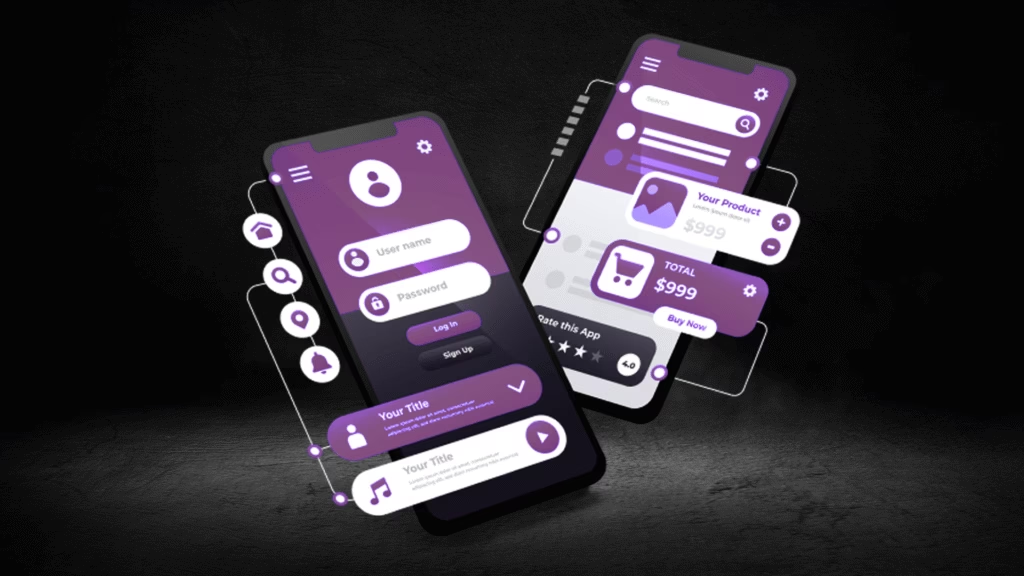
Introduction to AI in Mobile App Development
The integration of artificial intelligence (AI) in mobile app development is reshaping how applications are designed, developed, and interacted with, leading to a more robust and user-centric landscape. AI technologies, such as machine learning, natural language processing, and predictive analytics, empower developers to create applications that not only respond to user needs but also anticipate them. This proactive approach enhances user experiences, making interactions more intuitive and enjoyable.
One of the most significant advantages of AI in mobile app development is its ability to optimize performance. Through data analysis, AI can identify patterns in user behavior and preferences, enabling developers to make informed decisions when refining their applications. For instance, AI can suggest necessary updates or improvements based on user feedback and engagement analytics, ensuring that the app remains relevant and efficient. Moreover, AI-driven features, such as chatbots and virtual assistants, enhance communication and provide real-time support, ultimately leading to improved user satisfaction.
Furthermore, the adoption of AI in mobile app development streamlines the development process itself. Automated testing tools and AI-powered code generation significantly reduce the time and effort required to release high-quality applications. As the mobile market continues to evolve, the incorporation of AI technologies has become imperative for developers seeking a competitive advantage. The trends reflect a surge in AI usage within mobile applications, necessitating developers to stay informed about advancements and best practices. As AI capabilities continue to expand, the potential for innovative solutions within mobile app development is vast, signalling a transformative era for both developers and users alike.
Key AI Technologies Shaping Mobile Apps
The landscape of mobile app development is rapidly evolving, with artificial intelligence (AI) technologies playing a pivotal role in shaping modern applications. Among the various components of AI, machine learning stands out as a transformative force. By enabling apps to learn from user behavior and adapt accordingly, machine learning allows for personalized experiences, such as tailored content recommendations and predictive text inputs, enhancing user engagement and satisfaction.
Another critical AI technology influencing mobile applications is natural language processing (NLP). NLP facilitates seamless interaction between users and mobile apps through voice commands and chat interfaces. This technology enables applications to understand, interpret, and respond to human language, making it essential for the development of virtual assistants and customer support chatbots. The ability to process and analyze language data effectively leads to improved user experience and streamlined operations within apps.
Computer vision is yet another groundbreaking technology driving innovation in mobile app development. By allowing applications to interpret and analyze visual information from the camera feed, computer vision has paved the way for functionalities like facial recognition, augmented reality (AR) experiences, and automated image tagging. These features not only enhance usability but also provide novel ways for users to interact with their devices and the surrounding environment.
Lastly, chatbot frameworks have become indispensable in the realm of mobile app development. These frameworks integrate with AI technologies to create intelligent chatbots capable of offering real-time assistance and support. Apps enriched with chatbot functionality can provide users with answers to their queries, handle bookings, and even execute transactions, thereby streamlining services and enhancing customer satisfaction.
In essence, the integration of these AI technologies—machine learning, natural language processing, computer vision, and chatbot frameworks—significantly impacts mobile app development, creating a more interactive and intuitive user experience.
Benefits of Integrating AI into Mobile Apps
The integration of artificial intelligence (AI) into mobile app development has emerged as a pivotal trend, reshaping how applications are designed and experienced by users. One of the primary benefits of incorporating AI is improved user engagement through personalization. AI algorithms analyze user behavior and preferences, enabling apps to deliver tailored content and recommendations. For instance, popular streaming services utilize AI to suggest shows and movies based on individual viewing habits, thus fostering a deeper connection with users.
Another significant advantage is the increased automation and efficiency that comes with AI integration. By automating repetitive tasks, applications can streamline processes, allowing developers and users to focus on more complex issues. For example, chatbots powered by AI provide instant customer support, addressing inquiries without human intervention. This not only reduces response time but also improves the overall user experience.
Enhanced data analytics capabilities are yet another benefit. AI systems can process vast amounts of data at incredible speed, extracting insights that inform business strategies and improve app performance. Mobile applications can utilize AI for predictive analytics, enabling developers to anticipate user needs and trends. For example, fitness applications that use AI can analyze user data to provide custom workout plans or health tips, adapting in real time to the user’s progress.
Furthermore, AI algorithms can support better decision-making. By providing intelligent analytics and predictions, these algorithms empower users to make informed choices. For instance, financial apps leverage AI to analyze spending patterns, helping users manage their finances more effectively.
In summary, the incorporation of AI in mobile app development not only enhances user engagement but also optimizes operational efficiency, bolsters data analytics, and improves decision-making capabilities. As illustrated through various real-world examples, the benefits of integrating AI into mobile applications are profound, establishing a competitive edge in the rapidly evolving digital landscape.
Challenges of AI Integration in Mobile Development
The integration of artificial intelligence (AI) into mobile app development presents numerous challenges that developers must navigate to create effective and user-friendly applications. One prominent challenge is data privacy. With the increasing importance of user data, mobile developers must ensure that any AI-driven analysis or personalization does not compromise user privacy. This requires implementing robust privacy measures and gaining user consent for data usage, which can complicate the development process.
Another significant hurdle is the need for high-quality training data. AI systems rely on substantial amounts of accurately labeled data to improve functionality and effectiveness. In mobile app development, curating this data can be resource-intensive and often requires collaboration with data providers or the implementation of extensive data collection processes. Without high-quality data, the effectiveness of AI algorithms may be severely limited, inhibiting the seamless integration into the mobile app.
Resource-intensive processing requirements present a further challenge, as sophisticated AI algorithms may demand considerable computational power and storage. This can be particularly problematic for mobile devices, which often have limited processing capabilities compared to desktop or server environments. Developers must optimize their AI models to function efficiently on mobile platforms while maintaining app performance and user experience.
Lastly, implementing AI algorithms effectively involves navigating complexities associated with the various AI technologies available. Each AI method, from machine learning to natural language processing, brings different requirements and considerations. Developers must carefully select the appropriate algorithms and adapt them to the mobile app context, balancing performance, accuracy, and user experience. Addressing these challenges necessitates a strategic approach, involving ongoing research, user feedback, and iterative development to ensure that AI integration in mobile apps is both effective and beneficial for users.
Tools and Frameworks for AI-Driven Mobile App Development
As the landscape of mobile app development continues to evolve, the integration of artificial intelligence (AI) has become a critical factor in delivering enhanced user experiences. Several tools and frameworks are now available to assist developers in incorporating AI functionalities into their mobile applications. This section will explore some of the most popular platforms that facilitate AI-driven mobile app development.
One of the leading frameworks is TensorFlow Lite, a lightweight version of Google’s TensorFlow library specifically designed for mobile and embedded devices. TensorFlow Lite offers a variety of pre-trained models and supports custom model creation, making it easier for developers to implement machine learning capabilities into their applications. Its ease of use and efficient performance enable developers to build responsive apps with advanced AI features like image recognition and natural language processing.
Another noteworthy tool is Core ML, Apple’s machine learning framework. Core ML is designed to integrate seamlessly with iOS applications, allowing developers to incorporate AI capabilities without needing extensive machine learning expertise. With built-in support for various model types, Core ML simplifies the process of adding features such as recommendation systems and anomaly detection to mobile apps while ensuring optimal performance across Apple’s devices.
The AWS Mobile SDK is also a formidable option for developers aiming to integrate AI into their applications. It provides access to a suite of AWS services, including machine learning tools such as Amazon Rekognition for image analysis and Amazon Lex for conversational interfaces. By leveraging the AWS Mobile SDK, developers can easily scale their app’s features and make use of powerful AI functionalities.
Lastly, Google’s ML Kit is a versatile tool for integrating machine learning features into Android and iOS apps. ML Kit provides a set of ready-to-use APIs that cover various AI functionalities, such as text recognition, face detection, and barcode scanning. Its straightforward integration process allows developers to add complex AI capabilities to their applications with minimal hassle.
These tools and frameworks represent just a fraction of the options available in the burgeoning field of mobile app development. By utilizing these resources, developers can accelerate the incorporation of AI functionalities, paving the way for innovative applications that meet the ever-changing demands of users.
Best Practices for Designing AI-Powered Mobile Apps
Designing AI-powered mobile apps requires a fine balance between advanced technology and user-centric principles. One of the primary best practices is to prioritize user-centric design. This approach emphasizes understanding user needs, preferences, and behaviors. It is essential to conduct thorough user research, utilizing techniques such as interviews, surveys, and usability testing. By applying these insights, developers can create interfaces that resonate with users, ensuring that mobile app development aligns closely with user expectations.
Transparency is another critical aspect in the realm of AI integration within mobile applications. Users tend to be cautious about AI functionality, especially concerning data privacy and decision-making processes. By communicating how AI algorithms work, what data they use, and the intended benefits, developers can foster trust in their applications. This can be achieved through clear onboarding processes, tooltips, and regular updates, ensuring users are well-informed throughout their experience.
Moreover, maintaining user-friendliness is paramount. AI systems can sometimes complicate user interactions if not implemented carefully. Ensuring that AI features enhance rather than overwhelm the user experience is vital. For example, developers should utilize familiar design patterns and intuitive navigation structures, allowing users to interact effortlessly with AI functionalities. The goal is to create an experience where users feel comfortable and confident in leveraging the app’s capabilities without encountering confusion or frustration.
Finally, continuously gathering user feedback is essential for enhancing AI capabilities. Incorporating mechanisms for user input, such as ratings, reviews, and in-app surveys, enables developers to identify potential areas for improvement. Utilizing this feedback can lead to iterative enhancements, thereby refining the app’s performance and ensuring it evolves along with user expectations. By adhering to these best practices, mobile app development can harness AI technology effectively, delivering compelling user experiences that meet contemporary demands. In summary, prioritizing user-centric design, transparency, user-friendliness, and feedback will significantly enhance the quality of AI-powered mobile applications.
Future Trends in AI and Mobile App Development
As technology continues to evolve, the future of mobile app development is poised to be significantly influenced by advancements in artificial intelligence (AI). The integration of AI technologies in mobile applications enables developers to create more intuitive and personalized user experiences. With the continuation of this trend, it is expected that AI will play an increasingly central role in app functionality, making applications smarter and more efficient.
One of the primary drivers of change in mobile app development will be the rising user expectations for personalization and interactivity. Users now expect applications to understand their preferences and offer tailored recommendations. AI algorithms will enhance the ability of apps to learn from user interactions, predicting behaviors and adapting accordingly. This level of customization not only increases user satisfaction but also fosters greater customer loyalty.
Moreover, the advent of 5G technology and edge computing is set to transform mobile app development dramatically. The high-speed data transfer capabilities of 5G networks will enable mobile apps to perform complex AI computations more efficiently, rendering real-time processing of data feasible. This means applications can offer advanced features, such as augmented reality experiences and seamless video streaming, with minimal lag. Consequently, developers will need to adapt by optimizing their mobile app architecture to harness the substantial bandwidth provided by 5G.
Additionally, edge computing will facilitate the distribution and processing of data closer to its source, improving response times and overall performance of mobile applications. This technological convergence will support applications that require immediate data analysis and quick decision-making, such as those in healthcare and autonomous vehicles.
In conclusion, the intersection of AI and mobile app development is not only creating innovative opportunities but is also reshaping user interactions. As developers embrace these advancements, they will need to consider the implications of evolving technologies and shifting user expectations to remain competitive in the rapidly changing landscape.
Case Studies: Successful AI-Integrated Mobile Apps
In recent years, various mobile applications have successfully integrated artificial intelligence (AI) technologies, leading to enhanced user experiences and improved functionality. This section highlights three notable case studies, each illustrating different aspects of AI integration within mobile app development.
The first case study features a widely-used personal assistant app that utilizes AI-driven natural language processing (NLP) to understand user commands and deliver personalized responses. The primary objective was to create a seamless communication interface that mimics human conversation. However, the development team faced challenges related to dialect diversity and colloquialisms. Implementing machine learning algorithms enabled the app to adapt to various speech patterns and improve accuracy over time. As a result, user engagement significantly increased, and customer satisfaction ratings soared.
The second example revolves around a fitness application that harnesses AI technologies to provide personalized workout plans. The app utilizes computer vision and machine learning algorithms to analyze user movements in real-time during exercise. Although one of the challenges was ensuring that the AI could accurately assess movements across different users, fine-tuning the model helped address this issue. Consequently, users received customized feedback, leading to better exercise outcomes and fostering a sense of community within the app.
Lastly, we examine a mobile banking application that leveraged AI to enhance security and fraud detection. By integrating an AI-powered anomaly detection system, the app automatically identifies unusual patterns in user transactions. The challenge lay in effectively balancing user experience with security measures that could deter potential threats. By continuously training the AI model on vast datasets, the app achieved a high detection rate while minimizing false positives. This integration reduced financial fraud incidents and improved user trust and loyalty.
These case studies highlight the transformative impact of AI integration on mobile app development, showcasing not only the technologies employed but also the significant outcomes achieved in terms of user engagement and satisfaction.
Conclusion: The Future of Mobile Apps with AI Integration
The integration of artificial intelligence (AI) in mobile app development represents a pivotal shift in how applications are designed, developed, and utilized. As discussed, AI technologies streamline processes, enhance user experiences, and facilitate more intuitive interactions within mobile applications. The potential for AI to automate tasks, provide predictive analytics, and enable personalization fundamentally alters the landscape of mobile app development, making it an essential area for developers to explore.
One of the significant transformations brought by AI is the ability to analyze users’ behaviors and preferences to tailor app experiences, thus fostering higher engagement levels. This not only improves user retention rates but also maximizes monetization opportunities through targeted advertisements and recommendations. As users increasingly demand more from their mobile applications, the importance of integrating sophisticated AI capabilities cannot be overstated.
Moreover, for developers to maintain a competitive edge, it is crucial to stay updated with ongoing advancements in AI technologies. Continuous learning and adapting to the latest trends in mobile app development will empower developers to harness AI effectively. Platforms and frameworks are increasingly available, enabling even those with minimal experience to incorporate AI functionalities into their applications seamlessly. In an age where technology evolves rapidly, understanding and leveraging the potential of AI can reveal opportunities for innovation and growth.
In conclusion, the future of mobile app development is inextricably linked to the ongoing integration of AI technologies. Emphasizing creativity, user-centric design, and advanced analytics will not only enhance individual applications but also push the entire industry forward. Embracing these changes will be paramount for developers looking to thrive in the evolving app ecosystem.








